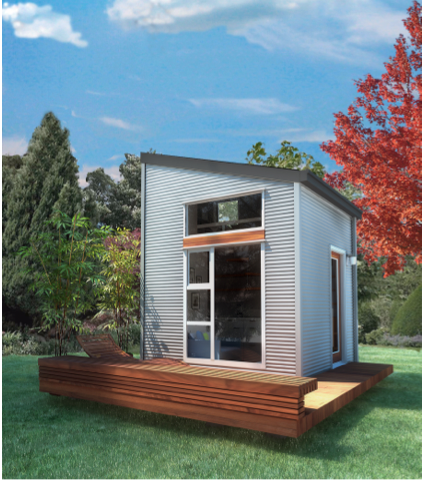Imagine being able to own a brand-new home for $25,000.

A Vancouver man hopes to revolutionize homeownership and small space living with his easy-to-assemble micro homes.
Nomad Micro Homes and its President Ian Kent are raising funds on the crowd-funding website indiegogo to make affordable micro homes a reality.
Kent says there are multiple uses for homes which are about 160 square feet in size.
“There’s a wide range of uses, from people using them as additional accommodation, to recreational property — you could basically drive this home in and assemble it in a week.”
The homes are easy to assemble and set-up.
“At least one handyman with a helper could assemble it in less than a week, it’s kind of an IKEA type model,” says Kent.
Three different models are proposed, starting at $25,000 for the base model, and $28,000 for the “Live” model that includes kitchen appliances and bathroom fixtures.
The homes don’t have a traditional foundation, instead they sit on screw piles. Screw piles are piles you can screw into the ground with your hands.
“You would be feeling very good about establishing a trend-setting mode of sustainability,” says Kent.
“You’re flexible in location – you could pick up and move it somewhere else.”
Buyers who want to go “off the grid” can upgrade to a composting toilet, solar power system, greywater treatment system and rainwater collection system.
All of the models can be hooked up to existing sewer, water and electrical systems.
The micro homes could be an answer to B.C.’s high real estate prices, but first, cities and municipalities need to change their bylaws, says Kent.
“The bylaws in many municipalities and cities don’t quite allow something like this, it’s something that we are going to start lobbying for once we have this product fully established.”
Vancouver currently stipulates that a home cannot not be smaller than 320 square feet.
“The bylaw may be a bit antiquated for the new sustainable housing models coming out. They’ve allowed laneway houses, but they still seem to be quite expensive to build and rent.”
“People are building small houses on trailers and remove locations where there are no bylaws to contend with,” says Kent.
Living in a smaller space would also force people to do more with less, says Kent.
“Your consumerism would drop, because you wouldn’t be able to fit in things that people usually buy. You would become very efficient and that’s going to be a forced savings in your bank account. Plus, you are going to become a fantastic recycler and you are going to come up with new methods of recycling, because you can’t fit garbage in your unit.”
Kent says they need to raise $120,000 on Indiegogo to meet their goal and fulfill anticipated orders.
“We will probably be getting some orders, and we want to be able to fulfill them. We might attract some investors, we just don’t know yet.”
He says they have had inquiries for the homes from all over the world.
“We have someone who wants to build one in Barrow, Alaska right on the edge of the tundra. It’s designed to go anywhere in the world. The shell itself is extremely efficient, and we can upgrade the insulation for colder climates.”











Comments